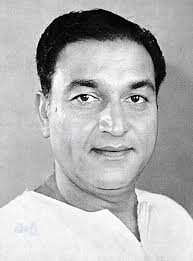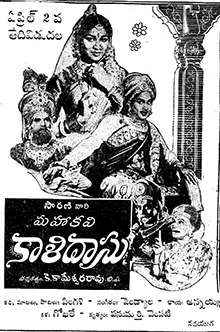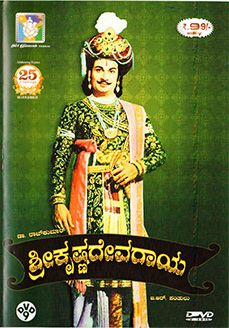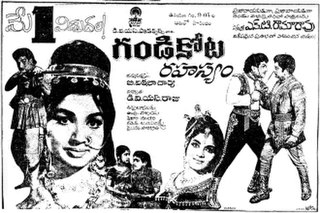
Krishnadevaraya was an emperor of the Vijayanagara Empire reigning from 1509 to 1529. He was the third monarch of the Tuluva dynasty, and is considered to be one of the greatest rulers in Indian history. He ruled the largest empire in India after the fall of the Islamic Delhi Sultanate. Presiding over the empire at its zenith, he is regarded as an icon by many Indians. Krishnadevaraya earned the titles Andhra Bhoja, Karnatakaratna Simhasanadeeshwara, Yavana Rajya Pratistapanacharya, Kannada Rajya Rama Ramana, Gaubrahmana Pratipalaka and Mooru Rayara Ganda. He became the dominant ruler of the peninsula by defeating the sultans of Bijapur, Golconda, the Bahmani Sultanate and the Gajapatis of Odisha, and was one of the most powerful Hindu rulers in India.

Rudrama Devi, also known by her regnal name Rudra-deva Maharaja, was a Kakatiya Queen-regnant who ruled substantial parts of present-day Telangana and Andhra Pradesh in southern India. She was among the few and the most successful female rulers of Indian history.
Saluva Timmarusu was the prime minister (mahapradhana) and military commander of Krishnadevaraya. He is also known as "Appaji". He had also served as the prime minister under Viranarasimha Raya and Tuluva Narasa Nayaka.
Tuluva is the name of the third Dynasty of the Vijayanagara Empire. The dynasty traces its patrilineal ancestry to Tuluva Narasa Nayaka, a powerful warlord from the westerly Tulu speaking region. His son Narasimha Nayaka arranged for the assassination of the weak Narasimha Raya II bringing an end to the rule of the Saluva dynasty. Narasimha Nayaka later assumed the Vijayangara throne as Viranarasimha Raya bringing the Tuluva dynasty to prominence. The dynasty was at its zenith during the rule of Krishnadevaraya, the second son of Tuluva Narasa Nayaka.

Gummadi Venkateswara Rao, known mononymously by his surname Gummadi, was an Indian actor and producer, who worked predominantly in Telugu cinema and a few Tamil films. Known as one of the finest supporting/character actors in Telugu cinema, Gummadi acted in around five hundred feature films. He received critical recognition for his work in Thodu Dongalu (1954) and Mahamantri Timmarusu (1962), for which he received the erstwhile Rashtrapati Award. Gummadi was an official member of the Indian delegation from South India to the Tashkent Film Festival in 1978 and 1982.
Tuluva Narasa Nayaka was an Indian general and later an Imperial Regent who founded the Tuluva dynasty of the Vijayanagara Empire. He was the father of the Emperors Viranarasimha Raya, Krishnadevaraya and Achyuta Deva Raya.

Tenali Ramakrishna is a 1956 Indian Telugu-language political drama film produced and directed by B. S. Ranga based on Ch. Venkataramaiah's stage play of the same name. Produced for the banner Vikram Productions, it stars NTR, Akkineni Nageswara Rao, V. Nagayya, Bhanumathi Ramakrishna, and Jamuna in key roles. Ranga handled the cinematography with his brother-in-law B. N. Haridas while P. G. Mohan edited the film. Viswanathan–Ramamoorthy composed the soundtrack and background score.

Jayabheri is a 1959 Indian Telugu-language biographical film directed by P. Pullayya who co-wrote the script with Acharya Aatreya. The film is based on the life of poet Kaasinath and stars Akkineni Nageswara Rao and Anjali Devi. The film was produced by Vasireddy Narayana Rao with music composed by Pendyala Nageswara Rao.

Mahakavi Kalidasu is a 1960 Indian Telugu-language biographical film directed by Kamalakara Kameswara Rao and written by Pingali. It stars Akkineni Nageswara Rao and Sriranjani Jr., with music composed by Pendyala. It was produced by K. Nagamani and P. Suri Babu. The film is based on the life of the poet Kalidasa.

Sri Krishnarjuna Yuddhamu is a 1963 Indian Telugu-language Hindu mythological film, produced and directed by K. V. Reddy under the Jayanthi Pictures banner. It stars N. T. Rama Rao, Akkineni Nageswara Rao and B. Saroja Devi, with music composed by Pendyala Nageswara Rao. The film was based on the Telugu play Gayopakhyanam written by Chilakamarti Lakshmi Narasimham in 1890. It was later dubbed into Kannada and into Tamil.

Premabhishekam is a 1981 Indian Telugu-language romantic drama film written and directed by Dasari Narayana Rao. Produced by Venkat Akkineni and Nagarjuna Akkineni under Annapurna Studios banner. It stars Akkineni Nageswara Rao, Jayasudha, Sridevi, Murali Mohan, Mohan Babu and music composed by Chakravarthy.

Sri Krishnadevaraya is a 1970 Indian historical drama film in the Kannada language, produced and directed by B. R. Panthulu. It stars Rajkumar as Krishnadevaraya, an emperor of the Vijayanagara Empire in the 16th century. R. Nagendra Rao, B. R. Panthulu, Narasimharaju and N. Bharathi appear in pivotal roles. The film was Rajkumar's first in color.

Sri Tirupati Venkateswara Kalyanam is a 1979 Indian Telugu-language Hindu mythological film, based on Lord Venkateswara Avatar at Tirumala, produced and directed by N. T. Rama Rao under his Ramakrishna Cine Studios banner. It stars N. T. Rama Rao, Jaya Prada, Jayasudha, Nandamuri Balakrishna and music composed by Pendyala Nageswara Rao.

Gandikota Rahasyam is a 1969 Telugu-language film co-written and directed by B. Vittalacharya. It stars N. T. Rama Rao, Jayalalitha with music composed by T. V. Raju. The film was produced by D. V. S. Raju under the DVS Productions banner. The film was dubbed in Hindi as Baghavat. It is remake of Tamil movie Nadodi Mannan (1958).

Prataparudra Deva was the third Gajapati emperor of Odisha from the Suryavamsa Gajapati Empire founded by his grandfather Kapilendra Deva Routaraya. He reigned from 1497 to 1540 CE. Besides being a monarch, he was a devout Vaishnava and adherent of the famous saint, Sri Chaitanaya who arrived in Odisha during his reign. His life was extremely occupied with overwhelming military campaigns in defense of his inherited territory from three frontal invasions by the enemy states Vijayanagar, Hussain Shahi dynasty of Bengal and Turko-Persian Qutb Shahi dynasty of Golconda. He lost large portions of his territory to the neighboring enemy states initiating the dissolution of Odisha's military hegemony and imperial status that continued for nearly a period of 600 years before him.

Tenali Rama is an Indian Hindi-language historical comedy drama based on the life of the legendary Telugu poet Tenali Ramakrishna, one of the Ashtadiggajas at the court of Vijayanagara emperor Krishnadevaraya, who is often cited as the greatest Vijayanagara emperor. The series premiered on Sony SAB on 11 July 2017 and went off-air on 13 November 2020.

Tirumala Devi was the senior wife and chief queen of Emperor Krishnadevaraya, who is considered to be the greatest ruler of the Vijayanagara Empire. She was also the most honoured wife of Krishnadevaraya, and the mother of his heir-apparent, Prince Tirumala, who died in his childhood.

Raja Nandini is a 1958 Telugu-language film, produced by M. Ramakrishna Rao and Midde Jagannatha Rao under the Jalaruha Productions banner and directed by Vedantam Raghavayya. It stars N. T. Rama Rao, Anjali Devi with music composed by T. V. Raju.

Rudramadevi – Saatileni Maharaju is a Telugu-language historical television series that airs on Star Maa. The series is based on the life of Rani Rudrama Devi. The show is produced by Alind Srivastava and Nissar Parvez under the banner Peninsula Pictures. The show started airing from 18 January 2021 on Star Maa and also available digitally on Disney+ Hotstar. The series is written by Sakthi Sagar Chopra and Lakshmi Jaya Kumar. It is one of the expensive Telugu television series. Ananya Dwivedi portrayed the Young Rudrama Devi, with Anand playing the character Ganapati Devudu.















